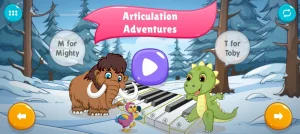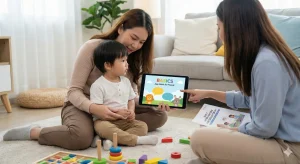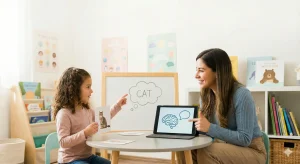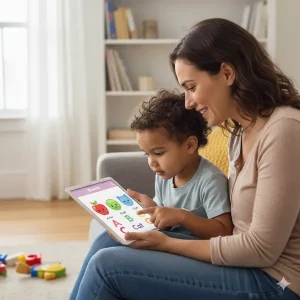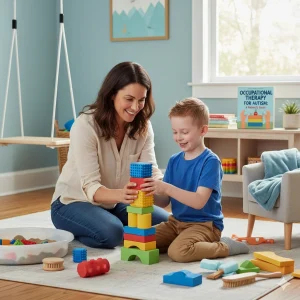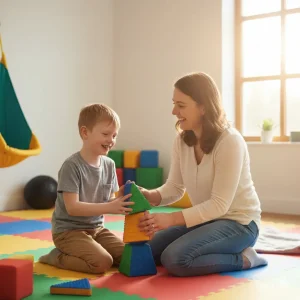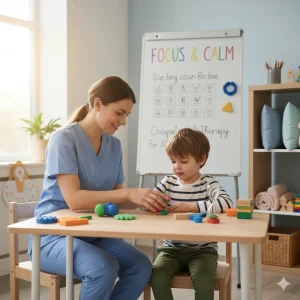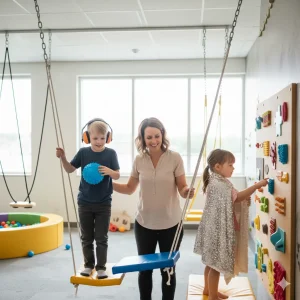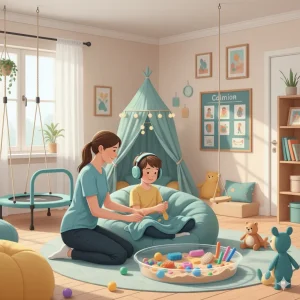Building Cognitive and Language Skills Together in BASICS App
By Wellness Hub
Last Updated: October 23, 2025
Have you ever noticed how your child learns to think and talk almost at the same time? When they point to a toy and say “ball,” they’re not just using a word — they’re connecting what they see, understand, and remember. This beautiful link between cognitive and language development is what helps children make sense of the world around them.
In the early years, building these two skills together is crucial. While language gives children a way to express ideas, cognitive skills like attention, memory, and reasoning help them understand those ideas first. That’s why focusing on both — not one at a time — makes learning natural and long-lasting.
The BASICS App is designed with this connection in mind. Created by therapists, it uses play-based, interactive activities that blend thinking and speaking seamlessly. From matching and memory games that sharpen focus, to question-and-answer tasks that spark expression, every activity helps your child think better, speak clearer, and learn faster — all through play.
The Connection Between Thinking and Speaking in Early Childhood
In early childhood, thinking and speaking develop hand in hand. Before a child can describe what they see, they must first understand and process it — this is where cognitive skills in toddlers begin to take shape. As your child starts recognizing patterns, sorting shapes, or matching colors, they’re not only learning new words but also forming mental connections that help them make sense of the world.
For example, when a toddler points to a red ball and says “ball,” it shows both cognitive understanding (recognizing the object and color) and language development (using a word to label it). Activities like naming colors, matching shapes, or describing pictures help children link what they know to what they can say. This process — moving from thought to expression — builds the foundation for clear communication and logical reasoning.
Cognition gives meaning to words, while language gives structure to thoughts. The more children engage in playful, visual, and hands-on experiences, the stronger their ability to think, reason, and communicate becomes. This balance is at the heart of early child development stages, where every new word reflects a deeper level of understanding.
Why Parents Should Focus on Both Together
Many parents naturally prioritize speech development, hoping their child will start talking sooner. However, focusing on language without nurturing cognitive growth can leave gaps in understanding and problem-solving. Speech alone doesn’t teach children how to think, reason, or make decisions — it’s the combination of both that fuels meaningful communication.
The BASICS App bridges this gap by blending visual reasoning games with vocabulary-building activities. For example, when a child sorts animals by size or matches pictures of similar objects, they’re sharpening observation, categorization, and reasoning skills — all while practicing language.
Through tasks that connect thinking and speaking, such as identifying “What is happening?” or matching “Which one is different?”, BASICS encourages children to explore, analyze, and describe. This integrated approach ensures that every speech goal is supported by understanding — so your child isn’t just repeating words, but truly thinking before they speak.
By engaging both the brain and the tongue, BASICS nurtures a deeper kind of learning — one where communication grows naturally from comprehension.
How BASICS App Builds Cognitive Skills Through Play
The BASICS App builds cognitive skills through a carefully designed, play-based structure that turns learning into an exciting discovery process. Instead of drills or rote exercises, children engage with colorful, interactive activities that challenge their thinking, attention, and memory — the essential pillars of early cognitive skill development.
At the heart of this learning journey lies Foundation Forest, the very first level of BASICS. It’s where children begin exploring games that improve focus, recall, matching, and visual reasoning — all through fun, screen-based play that feels like a story unfolding. Each activity is crafted to help children notice patterns, understand relationships between objects, and build persistence as they play.
Alongside Foundation Forest, the Thinking & Attention goals guide children through structured sequences that gradually increase in complexity. Starting with simple one-to-one matching, kids move toward challenging memory and reasoning exercises that encourage them to think ahead, compare, and problem-solve. These early mental exercises strengthen neural pathways for attention, logic, and decision-making — skills that support everything from language learning to school readiness.
By connecting visual learning with purposeful action, BASICS helps children develop focus and independent thought while having fun. Each small success builds confidence, showing that play can be both joyful and deeply educational.
Activities That Strengthen the Brain
Every activity in Foundation Forest is built around one goal — to make your child think, remember, and reason better through hands-on interaction.
- Matching and Memory Sets:
Children begin with simple matching games — finding identical objects, shapes, or colors — and progress to multi-step memory challenges that require recall and focus. These activities enhance attention span, visual discrimination, and short-term memory, helping children retain what they see and hear. - Pre-Math Concepts:
Through games like big vs. small, more vs. less, and tall vs. short, BASICS introduces logical reasoning early on. These pre-math activities teach children to compare, classify, and organize objects — foundational skills for later math learning and everyday problem-solving. - Odd-One-Out and Pattern Recognition:
Fun “find the odd one out” puzzles and sequence-based games build flexible thinking and analytical ability. By spotting differences and predicting what comes next, children strengthen both reasoning and decision-making — essential components of higher-order cognitive development.
Each activity is guided by playful cues, friendly visuals, and positive reinforcement, ensuring children stay motivated while learning. The result is a natural boost in cognitive skill development, as kids master attention, memory, and logical reasoning through play.
Language Learning That Grows With Cognitive Skills
Language development in kids is most effective when it grows hand in hand with their ability to think, observe, and reason. In the BASICS App, this connection is carefully nurtured through Levels 3 to 5 — Word Wonders, Vocabulary Valley, and Phrase Park — each designed to expand a child’s vocabulary and sentence skills naturally, through play-based, visual learning.
At this stage, children aren’t just memorizing words — they’re learning to connect what they see, hear, and do with meaningful speech. Every activity inside BASICS encourages children to name, describe, and reason, strengthening both comprehension and expression.
BASICS’ Word Wonders introduces first words using real-life visuals and video modeling, helping kids understand the connection between an object and its spoken label. In Vocabulary Valley, children explore words by category — animals, fruits, toys, and home items — which helps them organize vocabulary logically. Finally, Phrase Park takes them a step further, combining words into simple, meaningful sentences that build early grammar and confidence.
These levels work together like a guided pathway — from recognizing to understanding, and finally, to using language purposefully. By engaging with interactive visuals, voice prompts, and repetition, children strengthen attention, recall, and context-based learning — the foundation for real communication.
Naming, Describing, and Reasoning
In BASICS App, children learn much more than isolated words — they learn how to think with language. Through naming tasks, kids identify familiar objects like animals, toys, and foods, reinforcing both visual recognition and word recall.
As they progress, describing activities invite them to talk about colors, shapes, actions, and emotions, giving them the vocabulary to express what they notice. This builds not only speech and communication skills but also critical thinking and observation.
The app’s WH question games — “What is she doing?”, “Where is the cat?”, “Why do we brush our teeth?” — encourage reasoning and comprehension. Children must listen, think, and respond — transforming passive learning into active understanding. Over time, this practice helps them grasp cause-and-effect, sequence, and purpose — key aspects of cognitive development.
Each word learned through BASICS App becomes part of a bigger system of thought. By integrating visuals, reasoning, and expressive language, the app ensures that children don’t just learn to talk — they learn to communicate with understanding, connecting language to the real world around them.
The Science Behind BASICS App Integrated Learning Approach
The BASICS App isn’t just another educational tool—it’s a therapist-designed app built on proven principles of speech, cognitive, and play-based learning. Every activity in BASICS App is thoughtfully created by speech and occupational therapists to align with how a child’s brain naturally develops. Instead of treating communication and cognition as separate goals, BASICS App blends them seamlessly—because children learn best when they see, hear, and do at the same time.
Research in brain-based learning shows that children retain more when they engage multiple senses together. That’s exactly what BASICS does: it uses visual prompts, sounds, actions, and rewards to create meaningful connections between what a child experiences and what they say. This multi-sensory interaction activates multiple areas of the brain—boosting both attention and memory.
By combining speech practice with thinking games, BASICS App helps children link words with concepts. For instance, when a child hears “Find the big apple,” they not only recognize the sound and word but also understand its meaning through visual comparison. These early experiences lay the foundation for both language comprehension and problem-solving.
Through this integrated approach, BASICS App promotes steady progress in children who are developing speech, learning new words, or strengthening focus. It transforms screen time into active brain development, making learning joyful, natural, and lasting.
How Play Strengthens Neural Connections
Play is more than fun—it’s a biological necessity for learning. In BASICS App, every tap, match, and response strengthens neural pathways that support communication, attention, and reasoning.
When children repeat an activity—like matching objects or answering WH questions—the repetition reinforces existing brain circuits. Each variation in gameplay (new objects, colors, or questions) challenges them to adapt, promoting flexible thinking and stronger retention. This blend of consistency and novelty is key to long-term memory formation.
BASICS App also taps into cause-and-effect reasoning, which is fundamental to both speech and cognition. When a child realizes that tapping the correct picture triggers a sound, animation, or word, their brain learns that actions have meaning. This understanding connects perception, language, and logic—forming the cognitive groundwork for communication.
By turning everyday learning into structured play, BASICS App ensures that children don’t just memorize—they truly understand. These play-based speech learning experiences nurture curiosity, independence, and growth, shaping the brain development activities for children that lead to lifelong learning success.
Everyday Examples of Cognitive–Language Growth in the BASICS App
Learning in the BASICS App goes beyond tapping screens—it helps children think, speak, and respond meaningfully in ways that connect directly to daily life. Every activity is designed to strengthen both cognitive skills (like attention, memory, and reasoning) and language skills (like naming, describing, and expressing). This powerful combination turns practice time into real-life learning for kids, where speech becomes functional and purposeful.
How simple BASICS App activities naturally lead to real-world communication and thinking growth.
| Activity in BASICS App | Cognitive Skill Developed | Language Growth Example | Functional Communication Outcome |
|---|---|---|---|
| Matching Colors | Builds visual attention and categorization | Child says, “Red ball” or “Blue car” while tapping | Learns to identify and describe objects in real life |
| Spotting Mistakes | Improves reasoning, observation, and problem-solving | Child describes, “The fish is flying!” or “The man has two hats” | Learns to talk about what’s wrong, strengthening comprehension and verbal reasoning |
| Counting Objects | Enhances number sense, memory, and sequencing | Child says, “Three apples” or “There are two cats” | Begins to form complete sentences and use quantities in conversation |
| Matching Shapes or Sizes | Builds visual discrimination and comparative thinking | Child says, “The big circle,” or “Small cup” | Uses descriptive words to explain differences in daily life |
| Answering WH Questions | Strengthens understanding, recall, and critical thinking | Answers “What is she doing?” – “She is brushing her teeth.” | Improves conversation and understanding of actions and routines |
Each example in the BASICS App represents a real-world scenario where children think, respond, and communicate with intent. Whether your child is identifying a “red ball,” explaining “why the boy is running,” or counting “three apples,” they are developing both language precision and cognitive flexibility.
This process—called functional language learning—helps children apply what they practice in BASICS to real conversations, daily routines, and classroom interactions. It ensures that speech isn’t just repetition; it becomes understanding and expression.
By integrating visual reasoning, auditory prompts, and interactive play, BASICS App transforms screen time into a space where children observe, analyze, and express themselves naturally. The result is a confident communicator who doesn’t just name objects—but describes, questions, and connects ideas, both inside and outside the app.
Why Integrated Learning Matters More Than Separate Practice
When it comes to early childhood development, holistic learning for kids—where thinking, language, and play work together—creates far stronger results than isolated drills or flashcard practice. Children don’t learn in compartments. When they match, name, and describe objects, they’re not just memorizing words—they’re connecting ideas, sharpening observation, and forming real understanding.
In traditional learning setups, flashcards or worksheets focus only on rote memorization. While that may help recall, it doesn’t always encourage critical thinking or language use in context. For example, a child might recognize a picture of an apple but struggle to say, “I’m eating an apple.” The gap lies in how language and thinking connect—words must link with meaning, reasoning, and real-life experiences.
This is where the integrated learning approach in the BASICS App stands out. Every activity is designed to merge cognitive growth (like attention, memory, and reasoning) with language skills (like vocabulary, comprehension, and expression). When a child sorts colors, identifies shapes, or answers “What is she doing?” they’re not just recalling information—they’re processing, analyzing, and communicating it.
Research in early education supports this—children retain and apply knowledge better when multiple skills develop together. Integrated learning doesn’t just teach words; it builds understanding, reasoning, and confidence to use language meaningfully in daily life.
How BASICS Makes This Simple for Parents
The BASICS App takes the guesswork out of combining speech and cognitive learning. Its built-in progression guides children naturally—from matching to memory, from vocabulary to sentences—mirroring how real communication develops.
Parents don’t have to plan separate lessons or switch between flashcards and apps. In BASICS, each level flows into the next, so a child who starts by matching animals later learns to name, describe, and talk about them in short sentences.
- Matching activities strengthen visual focus and recognition.
- Memory games improve attention and recall.
- Vocabulary sets introduce meaningful words across themes like animals, foods, and emotions.
- Sentence-building levels help children combine these words to express ideas confidently.
This step-by-step structure ensures balanced growth—where thinking supports language, and language enhances thinking. Parents see progress unfold naturally as their child begins to understand, reason, and speak with clarity.
In short, BASICS App makes integrated learning easy—turning screen time into a powerful mix of language practice, cognitive growth, and joyful play.
Supporting Early Intervention With BASICS
Early intervention is one of the most effective ways to help children with speech delay, autism, or communication challenges reach their full potential. The earlier a child begins structured play-based learning, the faster they build attention, comprehension, and expressive language — all while having fun.
The BASICS App brings early intervention to your home with therapist-designed activities that target the foundations of learning — focus, listening, understanding, and speaking — through interactive play.
Here’s how BASICS supports early speech and cognitive development from the start:
1. Play-Based Learning Designed for Early Intervention
- Every activity in BASICS is built around interactive visuals and real-life scenarios that make learning natural and engaging.
- Instead of flashcards or drills, children learn by tapping, matching, and responding, which keeps them motivated to practice daily.
- This approach strengthens attention, memory, and comprehension, key skills needed for early speech growth.
2. Building Attention Before Speech
- Many children with speech delay or autism struggle to sustain focus or respond to cues.
- BASICS introduces step-by-step activities — starting from simple matching and sound identification, then gradually moving to naming and sentence practice.
- The progression helps children develop joint attention (looking, listening, responding) — an essential milestone before speech emerges.
3. Strengthening Understanding and Expression
- BASICS teaches children to listen, identify, and respond — transforming passive watching into active participation.
- Activities like “What is this?”, “Where is the cat?”, or “Why do we wash our hands?” improve both receptive (understanding) and expressive (speaking) language.
- By pairing visuals with sounds and voice cues, BASICS helps children make connections between words, actions, and meanings.
4. Guided Home Support With Tele-BASICS
- For parents who want expert guidance, Tele-BASICS combines the BASICS app with live online therapy sessions led by certified speech therapists.
- Therapists use BASICS activities during sessions to track progress, adjust goals, and coach parents on daily practice routines.
- This hybrid model ensures that therapy continues at home — reinforcing skills between sessions and improving outcomes.
Read More: Tele-BASICS – The Perfect Tool for Online Therapy
5. A Safe, Consistent Routine for Every Child
- BASICS provides structured repetition — a predictable and comforting learning pattern ideal for children with autism or attention challenges.
- Parents can set short, goal-based sessions (10–15 minutes) each day to maintain consistency.
- Over time, small daily practice leads to measurable gains in speech clarity, attention span, and comprehension.
Conclusion:
The BASICS App is more than a speech therapy tool — it’s a complete learning experience where thinking and speaking grow together. Every tap, match, and question inside the app strengthens both your child’s cognitive skills (like attention, memory, and reasoning) and language abilities (like vocabulary, comprehension, and expression).
Here’s how BASICS helps your child play, think, and speak — all in one flow:
- Think before speaking: Each activity encourages your child to observe, process, and make sense of what they see — forming the foundation for meaningful speech.
- Play with purpose: Fun tasks like matching, memory games, and WH question challenges improve focus, reasoning, and problem-solving while keeping your child engaged.
- Speak with confidence: As your child understands more, they naturally begin to use words, phrases, and sentences — turning thoughts into clear communication.
- Learn naturally: With visual prompts, interactive sounds, and therapist-designed levels, children learn to connect ideas effortlessly through everyday play.
- Grow beyond words: The integration of cognitive and language development prepares your child not just for speech, but for school, relationships, and lifelong learning.
When children learn through play, they don’t just memorize — they understand, express, and explore.
That’s what makes BASICS app unique — it turns daily screen time into a powerful opportunity to build curiosity, confidence, and connection through every playful moment.
About Wellness Hub
Wellness Hub is a trusted digital platform that empowers parents, caregivers, and professionals with science-backed tools for childhood development. From online speech therapy to home therapy resources, we offer a holistic ecosystem for children facing speech delays, autism, ADHD, and other developmental challenges.
Rooted in evidence-based practices and delivered by certified experts, Wellness Hub bridges the gap between accessibility and quality care. Whether you need at-home speech strategies, developmental checklists, or interactive mobile apps like BASICS App, we make early intervention affordable and family-friendly.
Start your journey today with expert guidance tailored to your child’s unique communication and learning needs—anytime, anywhere.
Frequently Asked Questions
1. How does the BASICS app support both cognitive and language skills?
BASICS strengthens cognitive and language skills together by combining visual, auditory, and interactive learning. Children build attention, memory, and reasoning through matching and sorting games while simultaneously learning to name, describe, and talk about what they see. Each level connects thinking with communication—so children learn not only to understand but also to express their ideas clearly.
2. At what age should I start cognitive-language activities with my child?
Parents can start using BASICS App as early as 2 years old. The app’s Foundation Forest level introduces matching, sounds, and early vocabulary suited for toddlers. As your child grows, advanced levels like Word Wonders and Phrase Park build on early attention and language skills, ensuring continuous development from ages 2 to 6 years.
3. Can BASICS App help children with speech delay or slow processing?
Yes. BASICS App is designed by speech and occupational therapists to support children with speech delay, autism, or attention challenges. The structured play-based design allows children to learn at their own pace, practice listening, and respond visually. Repetition, clear audio prompts, and gradual progression help improve both comprehension and expressive language.
4. Which BASICS App levels are best for attention and memory?
Levels such as Foundation Forest and Thinking & Attention focus specifically on building attention, focus, and recall. Activities like matching pairs, finding missing halves, and spotting mistakes strengthen working memory and observation. These cognitive foundations later support communication, vocabulary learning, and sentence-building.
5. How is play-based learning better than traditional flashcards?
Play-based learning in BASICS App keeps children actively engaged through interactive visuals and sounds. Unlike static flashcards, it encourages participation, reasoning, and feedback. Children think, respond, and receive positive reinforcement, which boosts motivation and memory retention—making learning natural and enjoyable.
6. Does BASICS App teach both receptive and expressive language?
Yes. BASICS App teaches receptive language (understanding what is heard or seen) through listening and tapping activities, and expressive language (using words to communicate) through naming, describing, and sentence-building exercises. This dual focus ensures that children comprehend before they speak, leading to confident communication.
7. How does BASICS App improve my child’s problem-solving and reasoning skills?
BASICS App includes cognitive games that involve comparing, categorizing, and identifying patterns. These tasks help children reason through choices and think critically. As they describe what they see or make decisions (e.g., “Which one is bigger?”), they naturally combine logical thinking with verbal expression.
8. Is BASICS App suitable for children with autism or ADHD?
Yes. BASICS App supports neurodiverse learners by offering structured visuals, predictable routines, and therapist-designed progression. The app promotes joint attention, focus, and communication through gamified tasks that reduce pressure and build confidence—ideal for children on the autism spectrum or with attention challenges.
9. How can parents use BASICS App to reinforce learning at home?
Parents can schedule short, daily BASICS sessions (10–15 minutes) to practice specific goals such as memory, vocabulary, or WH questions. The Goal Mode feature guides parents step-by-step, while Progress Reports show improvements in both cognitive and language milestones, helping parents stay actively involved in learning.
10. What makes BASICS App different from other learning apps?
Unlike general educational apps, BASICS is therapist-developed and integrates speech, cognition, and emotional learning within one structured program. Its goal-based design ensures skill progression—from attention to expression—making it a complete, scientifically grounded tool for early development.
Book your Free Consultation Today
Parent/Caregiver Info:
Client’s Details:
* Error Message
